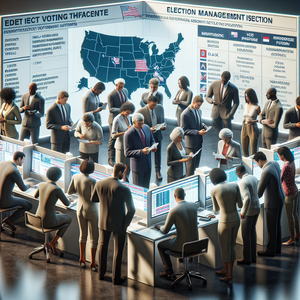
Careers in Election Administration: Vital Roles for Fair and Efficient Voting
Election administration stands as a vital pillar of democracy, essential for ensuring that electoral processes are conducted with integrity and efficiency. As our political landscape shifts due to technological advancements and evolving voter demographics, the demand for skilled professionals in this field has never been greater. A wide array of positions—from managing voter registration to overseeing complex election logistics—plays a crucial role in building public confidence in the electoral system. Recent data underscores a growing need for knowledgeable election workers, particularly as states implement measures to enhance voter accessibility and security. This article will delve into key positions within election administration, elucidating their responsibilities and qualifications while showcasing how each role contributes to a fair and democratic electoral process. We will also explore current job market trends, including statistics on openings and average salaries, to guide those interested in making a meaningful impact in this essential sector.
Job Summaries:
Election Administrator:
- At the heart of the electoral process are Election Administrators, who oversee operations within their jurisdictions.
- These professionals are responsible for coordinating logistics, managing voter registration, and ensuring strict adherence to election laws.
- Typically possessing a bachelor’s degree in public administration or a related field, they excel in organization and communication.
- Daily tasks may include preparing election materials, training poll workers, and addressing voter inquiries, all vital for maintaining public trust in elections.
- With a rising demand for these positions, candidates can find numerous opportunities in local and state election offices.
Voter Registration Specialist:
- Voter Registration Specialists ensure the accuracy and accessibility of voter registration systems.
- They manage new registrations, update records, and comply with state regulations.
- Generally requiring at least a high school diploma and data entry skills, their meticulous work is crucial for facilitating voter participation.
- As the focus on accurate voter rolls intensifies, job opportunities in this area are expanding.
Poll Worker:
- Poll Workers, also known as election inspectors or judges, are the face of the election on Election Day.
- Their responsibilities include setting up polling places, checking in voters, and guiding them through the voting process.
- Usually, poll workers must be at least 18 years old and registered voters, receiving on-the-job training.
- This role directly enhances voter experience, contributing to higher turnout and civic engagement.
- Local job listings frequently provide opportunities for individuals looking to serve their communities.
Election Data Analyst:
- Election Data Analysts play a crucial role in examining voting data to identify trends and ensure election results are accurate.
- Using statistical tools, they analyze data collected during elections, producing insights that can inform future electoral strategies.
- Typically requiring a background in statistics or data science, these professionals are pivotal in enhancing election transparency, as their analytical skills help improve electoral processes.
Ballot Designer:
- Ballot Designers create user-friendly ballots that meet legal standards, ultimately enhancing the voting experience.
- Collaborating with election officials, they ensure clarity and usability while testing ballots before elections.
- A degree in graphic design or communications is often necessary, along with proficiency in design software.
- By crafting effective ballots, they minimize voter errors and encourage participation, making this a rewarding career for those passionate about civic engagement.
Election Compliance Officer:
- Election Compliance Officers are responsible for ensuring that all electoral processes adhere to legal standards and regulations.
- They conduct audits, provide guidance to election officials, and monitor compliance with state and federal laws.
- A strong background in law or public policy is typically required.
- Their work is crucial for maintaining election integrity and promoting fair practices.
- Career opportunities are available in government agencies and organizations focused on electoral compliance.
Election Outreach Coordinator:
- Election Outreach Coordinators create strategies to boost voter participation and educate the public about voting processes.
- They collaborate with community organizations and local governments to promote voter registration and disseminate vital information.
- Usually requiring a bachelor's degree in communications or public relations.
- Their efforts are essential for fostering civic engagement and ensuring all community members are informed about their voting rights.
- Opportunities can be found in both nonprofit and governmental sectors.
Voting Technology Specialist:
- Voting Technology Specialists are responsible for implementing and maintaining voting systems and technology.
- They ensure that equipment is functional, secure, and compliant with regulations.
- Candidates typically possess a technical background in IT or engineering.
- Their expertise is crucial to safeguarding the integrity of the voting process amid evolving technology.
- This field offers exciting career paths for those passionate about tech and public service.
Election Research Analyst:
- Election Research Analysts delve into electoral trends and voter behavior.
- They evaluate the effectiveness of election laws.
- They conduct research, analyze data, and produce reports that guide decision-making for election officials.
- A degree in political science or sociology is typically required.
- Their insights are invaluable for understanding the electoral landscape and improving practices.
- Job opportunities are available in academic institutions, think tanks, and government agencies.
Election Communications Specialist:
- Election Communications Specialists manage all communications related to electoral processes.
- They prepare press releases and develop educational materials.
- A background in communications or journalism is often needed.
- Their role is vital for ensuring voters receive accurate, timely information.
- This information shapes public perception of elections.
- Opportunities exist in government agencies and nonprofits focused on voter education.
Campaign Finance Analyst:
- Campaign Finance Analysts monitor and analyze campaign finance data to ensure compliance with laws.
- They review financial reports from candidates and political committees, promoting transparency and accountability in campaign financing.
- A background in finance or political science is often required.
- Their work is critical in maintaining election integrity by preventing corruption and fostering fair competition.
Election Operations Manager:
- Election Operations Managers handle the logistical aspects of conducting elections.
- They are responsible for staffing, equipment procurement, and training.
- They work closely with local officials to ensure everything is in place for successful elections.
- Preferred candidates typically have a degree in public administration or management.
- This role is vital for ensuring smooth operations on Election Day.
- They significantly contribute to the fairness and efficiency of the electoral process.
Voter Education Coordinator:
- Voter Education Coordinators develop programs aimed at educating voters about their rights and voting procedures.
- They create informative materials and host workshops to increase awareness.
- A background in education or public policy is often necessary.
- Their initiatives empower voters and promote civic engagement, leading to higher turnout.
- Opportunities available in civic organizations and governmental agencies.
Election Security Analyst:
- Election Security Analysts focus on protecting election systems from cyber threats.
- They assess security protocols and implement measures to safeguard sensitive data.
- Typically requiring a degree in cybersecurity or information technology, their role is essential for ensuring the electoral process remains secure and trustworthy.
- Candidates interested in cybersecurity can find job opportunities in election offices and government agencies.
Election Policy Advisor:
- Election Policy Advisors guide the development of election-related policies by analyzing existing laws, proposing changes, and assisting in drafting legislation aimed at improving electoral processes.
- A background in law or public policy is often necessary.
- Their contributions help shape the legal framework governing elections, promoting fair and accessible voting.
- Interested candidates can seek advisory roles in governmental agencies or nonprofits focused on electoral reform.
Civic Engagement Director:
- Civic Engagement Directors lead initiatives to enhance voter participation and community involvement.
- They develop programs, organize events, and collaborate with stakeholders to nurture civic engagement.
- A degree in social sciences or public administration is typically required.
- Their work fosters a culture of civic participation, ensuring diverse voices are represented in the electoral process.
- Leadership opportunities abound in nonprofit organizations and local governments.
Election Training Coordinator:
- Election Training Coordinators design and implement training programs for election workers.
- They create materials, conduct workshops, and ensure personnel are well-prepared for their roles.
- A background in education or public administration is often required.
- Their work is vital in equipping election staff with the necessary skills for a smooth electoral process.
- Job openings are available in election offices.
Absentee Ballot Coordinator:
- Absentee Ballot Coordinators manage the absentee voting process.
- They ensure that voters unable to vote in person receive their ballots.
- They guarantee all votes are accurately counted.
- They oversee applications and compliance with state regulations.
- Typically, this role requires a background in public administration or election management.
- This role is crucial for facilitating access to voting, particularly for those unable to attend polling places.
- Opportunities are available in local election offices.
Election Research Consultant:
- Election Research Consultants offer expert analysis and recommendations on electoral policies and practices.
- Their research assesses integrity and informs officials on best practices.
- Candidates generally need a strong background in political science or data analysis.
- Their insights are invaluable in improving electoral processes and ensuring fair and effective elections.
- Consulting roles are available in research firms or governmental agencies.
Election Legislative Analyst:
- Election Legislative Analysts track and analyze proposed legislation related to elections.
- They assess the potential impacts of laws on the electoral process.
- A background in law or political science is often required.
- Their work is critical in shaping the legal landscape of elections.
- They ensure policies promote fair access to voting.
- Candidates can look for positions in legislative offices or advocacy groups.
In an evolving electoral landscape, the diverse roles within election administration offer rewarding career opportunities for individuals eager to contribute to the democratic process. Each position plays a pivotal role in ensuring elections are fair, transparent, and accessible, ultimately influencing the functioning of democracy. With a consistent demand for skilled professionals in this field, now is an ideal time to explore career paths in election administration and make a significant difference in civic engagement and electoral integrity.
Explore More Jobs
